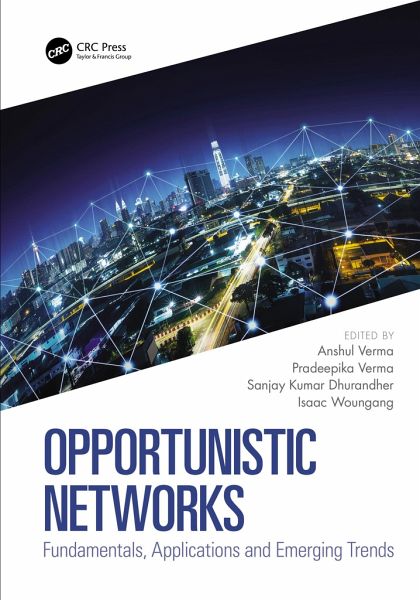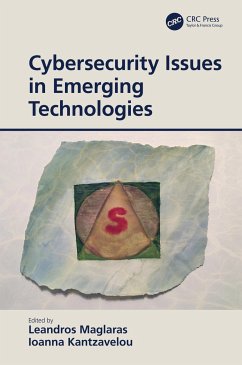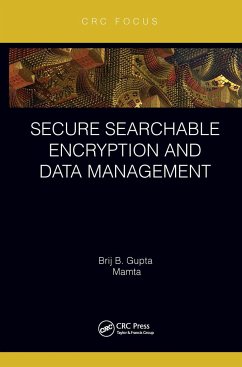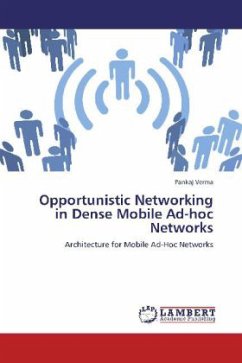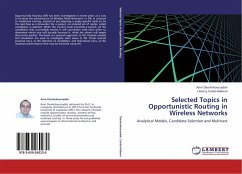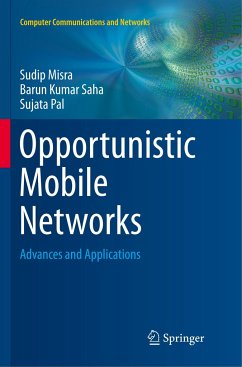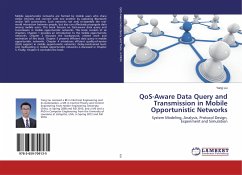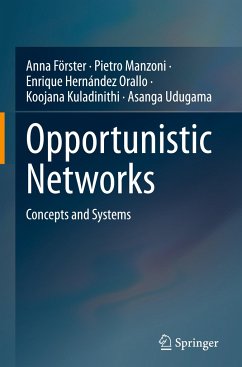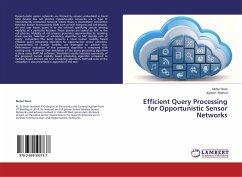Gebundenes Buch
Opportunistic Networks
Fundamentals, Applications and Emerging Trends
Herausgeber: Verma, Anshul; Dhurandher, Sanjay Kumar; Verma, Pradeepika
Versandkostenfrei!
Versandfertig in 1-2 Wochen
Weitere Ausgaben:

PAYBACK Punkte
75 °P sammeln!




This book provides theoretical, algorithmic, simulation, and implementation-based research developments related to fundamentals, applications, and emerging research trends in opportunistic networks.
Dr. Anshul Verma received M.Tech. and Ph.D. degrees in Computer Science & Engineering from ABV-Indian Institute of Information Technology and Management Gwalior, India in 2011 and 2016, respectively. He has done Post-doctorate from Indian Institute of Technology Kharagpur, India in 2017. Currently, he is serving as Assistant Professor in Department of Computer Science, Institute of Science, Banaras Hindu University Varanasi, India. He has also serve as faculty in Computer Science & Engineering at Motilal Nehru National Institute of Technology (MNNIT) Allahabad and National Institute of Technology (NIT) Jamshedpur, India, from 2015 to 2017. His research interests include Opportunistic networks, Mobile ad-hoc networks, Distributed systems, Formal verification, and Mobile computing. He is serving as the Editor of Journal of Scientific Research, BHU, Varanasi, India. Dr. Pradeepika Verma received her Ph.D. degree in Computer Science & Engineering from Indian Institute of Technology (ISM) Dhanbad, India, in 2020. She has received M.Tech in Computer Science & Engineering from Banasthali University, Rajasthan, India, in 2013. Currently, she is working as Assistant Professor in Department of Computer Science & Engineering, Pranveer Singh Institute of Technology, Kanpur, India. Prior to this, she has worked as faculty in Department of Computer Application at Institute of Engineering and Technology, Lucknow, India. Her current research interests include Opportunistic networks, Natural Language Processing, Optimization Approaches, and Information Retrieval. Prof. Sanjay Kumar Dhurandher received the M. Tech. and Ph.D. Degrees in Computer Sciences from the Jawaharlal Nehru University, New Delhi, India. He is presently working as Professor and Head in the Division of Information Technology, Netaji Subhas Institute of Technology (NSIT), University of Delhi, India. He is also the Head of the Advanced Centre CAITFS, Division of Information Technology, NSIT, University of Delhi. Prior to this, from 1995 to 2000 he worked as a Scientist/Engineer at the Institute for Plasma Research, Gujarat, India which is under the Department of Atomic Energy, India. His current research interests include wireless ad-hoc networks, sensor networks, computer networks, opportunistic networks, network security and Underwater Sensor Networks. He is serving as the Associate Editor of Wiley's International Journal of Communication Systems. Prof. Isaac Woungang received the M.A.Sc. and Ph.D. degrees in Mathematics from the University of Aix-Marseille II and University of South, Toulon & Var, France, in 1990 and 1994 respectively. He joined the Department of Computer Science at Ryerson University in 2002 and was promoted to Full Professor in 2014. He served the Department as Associate Chair, Undergraduate Program Director (2013-2014 & 2016-2018), Interim Graduate Program Director (Jan 2011-Sept. 2011) and Coop Program Coordinator (2006-2018). During his sabbatical (Jan. 2009-June 2009 and Jan 2016-Apr. 2016), he was a Visiting Professor at National Ilan University, Taiwan, R.O. C. and Fukuoka Institute of Technology, Japan, respectively. He leads the Distributed Applications and Broadband NEtworks Laboratory (DABNEL) research group. His research interests include radio resource management, computer security, heterogeneous networks, computational intelligence and machine learning applications, performance modelling, analysis and optimization. He served as Editor for several International Journals by IEEE, Wiley, Springer, and Elsevier. He also co-edited 15 books and 1 authored book. He also served as TPC member of several IEEE conferences and symposiums, and as IEEE Toronto, Computer Chapter Chair (2012-2016).
Produktdetails
- Verlag: CRC Press
- Seitenzahl: 332
- Erscheinungstermin: 19. August 2021
- Englisch
- Abmessung: 260mm x 183mm x 22mm
- Gewicht: 821g
- ISBN-13: 9780367677305
- ISBN-10: 036767730X
- Artikelnr.: 62229257
Herstellerkennzeichnung
Libri GmbH
Europaallee 1
36244 Bad Hersfeld
gpsr@libri.de
Für dieses Produkt wurde noch keine Bewertung abgegeben. Wir würden uns sehr freuen, wenn du die erste Bewertung schreibst!
Eine Bewertung schreiben
Eine Bewertung schreiben
Andere Kunden interessierten sich für



